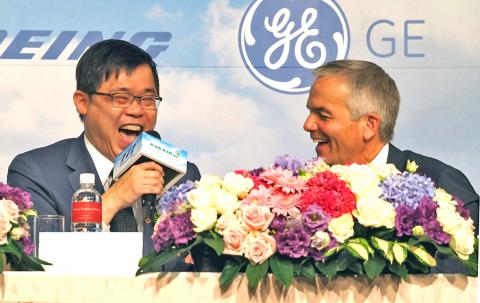EVA Airways Corp (長榮航空) yesterday signed a NT$50 billion (US$1.6 billion) deal with Boeing Co to procure five new freight aircraft.
The Taiwanese carrier is expected to receive the first of five Boeing 777 Freighters in October 2017 and have all five in operation by September 2019, EVA Air chairman Chang Kuo-wei (張國煒) said.
The 777 Freighter uses about 20 percent less fuel than the older Boeing 747-400 cargo aircraft in the company’s fleet, Chang said.

Photo: EPA
He said that it is crucial for the company to modernize its fleet, as the cargo sector is beset by dwindling margins and declining transport volume.
“The Boeing 747-400 is no longer the ideal choice, as there is no longer enough demand to fill it to capacity on each flight,” Chang said, adding that the 777 Freighter’s smaller capacity of 85 to 90 tonnes affords much more flexibility.
The new aircraft also shares many characteristics with other 777 series aircraft in EVA Air’s fleet, which will allow pilots to easily switch between flying cargo and passenger aircraft and simplify maintenance, he said.
EVA Air also plans to purchase 24 to 26 passenger aircraft in 2018 or 2019, which is expected to be one of the carrier’s largest procurement bids ever, Chang said.
The company is considering the Boeing 787 and the Airbus A350, and has urged Boeing senior vice president John Wojick to provide a more “friendly” price in the upcoming purchase, he said.
In light of the carrier’s lengthy history with Boeing aircraft powered by General Electric Co (GE) engines, Chang said that the 787 would be the ideal choice, as the A350 is powered by Rolls-Royce PLC engines, which would complicate maintenance.
Growth prospects are expected to be constrained for its maintenance business, he said.
“In terms of engine maintenance, many manufacturers are requiring clients to use their own first-party services or risk having their warranties voided, leaving other operators out of the picture,” Chang said.
Evergreen Aviation Precision Corp (EGAP, 長榮航與精密), an affiliated business of EVA Airways, has started shipments of its rigid cargo barriers for Boeing freight aircraft and has delivered 11 units since December last year as part of a contract that runs through 2019, he said.
GE awarded EGAP a six-year contract to supply 45 parts for the US company’s next-generation LEAP (leading-edge aviation propulsion) engine, he added.
Chang said the Taiwanese firm is striving to establish a vertically integrated aviation supply chain, aiming to tap into the market for aircraft parts assembly.

Sweeping policy changes under US Secretary of Health and Human Services Robert F. Kennedy Jr are having a chilling effect on vaccine makers as anti-vaccine rhetoric has turned into concrete changes in inoculation schedules and recommendations, investors and executives said. The administration of US President Donald Trump has in the past year upended vaccine recommendations, with the country last month ending its longstanding guidance that all children receive inoculations against flu, hepatitis A and other diseases. The unprecedented changes have led to diminished vaccine usage, hurt the investment case for some biotechs, and created a drag that would likely dent revenues and

Global semiconductor stocks advanced yesterday, as comments by Nvidia Corp chief executive officer Jensen Huang (黃仁勳) at Davos, Switzerland, helped reinforce investor enthusiasm for artificial intelligence (AI). Samsung Electronics Co gained as much as 5 percent to an all-time high, helping drive South Korea’s benchmark KOSPI above 5,000 for the first time. That came after the Philadelphia Semiconductor Index rose more than 3 percent to a fresh record on Wednesday, with a boost from Nvidia. The gains came amid broad risk-on trade after US President Donald Trump withdrew his threat of tariffs on some European nations over backing for Greenland. Huang further

CULPRITS: Factors that affected the slip included falling global crude oil prices, wait-and-see consumer attitudes due to US tariffs and a different Lunar New Year holiday schedule Taiwan’s retail sales ended a nine-year growth streak last year, slipping 0.2 percent from a year earlier as uncertainty over US tariff policies affected demand for durable goods, data released on Friday by the Ministry of Economic Affairs showed. Last year’s retail sales totaled NT$4.84 trillion (US$153.27 billion), down about NT$9.5 billion, or 0.2 percent, from 2024. Despite the decline, the figure was still the second-highest annual sales total on record. Ministry statistics department deputy head Chen Yu-fang (陳玉芳) said sales of cars, motorcycles and related products, which accounted for 17.4 percent of total retail rales last year, fell NT$68.1 billion, or

HSBC Bank Taiwan Ltd (匯豐台灣商銀) and the Taiwan High Prosecutors Office recently signed a memorandum of understanding (MOU) to enhance cooperation on the suspicious transaction analysis mechanism. This landmark agreement makes HSBC the first foreign bank in Taiwan to establish such a partnership with the High Prosecutors Office, underscoring its commitment to active anti-fraud initiatives, financial inclusion, and the “Treating Customers Fairly” principle. Through this deep public-private collaboration, both parties aim to co-create a secure financial ecosystem via early warning detection and precise fraud prevention technologies. At the signing ceremony, HSBC Taiwan CEO and head of banking Adam Chen (陳志堅)